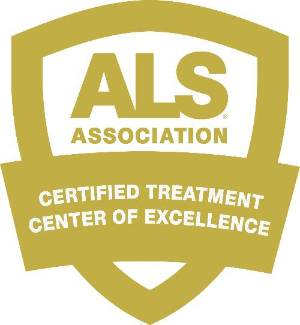Specialty Clinics
Adult Neurology Clinics Child Neurology Clinics
ALS Clinic
This is an official Muscular Dystrophy Association (MDA)/ALS center and an ALS Association Certified Center of Excellence.
The ALS (Amyotrophic Lateral Sclerosis) Clinic provides comprehensive care and education for adults with ALS. Our experienced and compassionate team works closely with patients and their families throughout their ALS journey. Our goal is to partner with patients to maximize patient's health, functioning, and ability using available therapy, equipment, exercise, and nutrition.
The ALS clinical team specializes in neuromuscular disorders and other conditions associated with ALS. After thorough assessment, the team works closely with patients to create a comprehensive clinical care plan, including respiratory evaluations, physical therapy, occupational therapy, nutrition, speech and swallowing, mental health, and access to resources. Please see the below site for more information.

Electrophysiology Clinic
The Electrophysiology Clinic evaluates disorders involving the muscle and nerve. Our physicians evaluate adults with neuromuscular disorders and then determine if studies such as electromyography (EMG) or nerve conductions will aid in a diagnosis. To schedule an appointment please call the LSU Healthcare Network Clinic at (504) 412-1517.
Epilepsy Clinic
LSUHSC is an Epilepsy Center of Excellence. Our outpatient epilepsy clinic evaluates patients to determine a treatment plan that would be best for them. treatment options may include but are not limited to medication management, vagus nerve stimulator and epilepsy surgery. To schedule an appointment with our epileptologist please call the LSU Healthcare Network Clinic at (504) 412-1517.
Multiple Sclerosis Clinic
Muscular Dystrophy Clinic
This is an official Muscular Dystrophy Association (MDA) center. Adults with neuromuscular disease are seen by an expert medical team. Our multidisciplinary team helps to provide medical and supportive treatment for patients living with a neuromuscular disease. A referral is needed for this clinic and should be sent to the LSU Health clinic Fax: 504-412-1538 or Phone: 504-412-1517.

Resident Clinic
Our Resident continuity clinic is held every Monday morning, staffed by a variety of neurologic subspecialists, and is equipped to treat a broad array of neurologic illnesses. It is resident driven and patient-centered with an emphasis on continuity of care. The clinic strives to remain a great resource in the treatment of general neurological conditions for the people of Southeast Louisiana and the surrounding communities.
Stroke Clinic
Our Stroke clinic is held every Tuesday morning, staffed by our vascular neurology specialist, Dr. Lionel Branch and is equipped to deal with a broad range of clinical stroke syndromes and scenarios. Emphasis lies in discovery, assessment, and treatment of underlying stroke risk factors; focusing on preventative medicine to reduce long-term disease burden and stroke recurrence. This clinic remains active in post-stroke rehabilitation and assessment of therapy needs while on the road to recovery.
Cerebral Palsy Clinic
This multidisciplinary clinic has Neurology, PM&R, and Orthopedics specialists Occupational and Physical therapist also attend the clinic. For an appointment in this clinic a physician referral is needed.
Epilepsy Clinic
Children and adolescents are evaluated and treated by our epileptologists at Children’s Hospital. Our Epilepsy Center offers diagnostic testing and treatment of epilepsy in children and adolescents. Treatment options include medications, dietary changes, vagus nerve stimulator or surgical options. Please call 504-896-9458 to make an appointment.
Headache Clinic
Children and adolescents with headache disorders including migraine, tension, and other headache disorders are seen by our headache physicians. A multidisciplinary clinic with psychology is also available. Referrals are recommended and you may call 504-896-9458 to make an appointment.
Muscular Dystrophy Clinic/Neuromuscular Clinic
Children and adolescents are seen in this clinic by our neuromuscular Neurologists
and PM&R for diseases such as Duchenne muscular dystrophy, spinal muscular atrophy,
Charcot Marie Tooth, and myasthenia gravis. An additional multidisciplinary clinic
is also available with our neuromuscular Neurologists, PM&R, Orthopedics and Pulmonary
physicians. Occupational and Physical therapist also attend the clinic. For an appointment
in this clinic a physician referral is needed.

New Onset Seizure Clinic
Children and adolescents that have had a first time unprovoked seizure can be referred by the emergency room or pediatrician for a clinic evaluation with an electroencephalogram and epileptologist evaluation for further diagnosis and management. For an appointment in this clinic a physician referral is needed.
Child Neurology Resident Continuity Clinic
Our resident continuity clinic is held every Wednesday and is staffed with child neurology attendings. A wide variety of patients with neurological diseases are followed throughout our child neurology residents career allowing for continuity through the years. Please call 504-896-9458 to make an appointment.
Spasticity Clinic
Children and adolescents with cerebral palsy or other diagnosis are evaluated for the need of medications, Botox, or baclofen pumps. For an appointment in this clinic a physician referral is needed.
